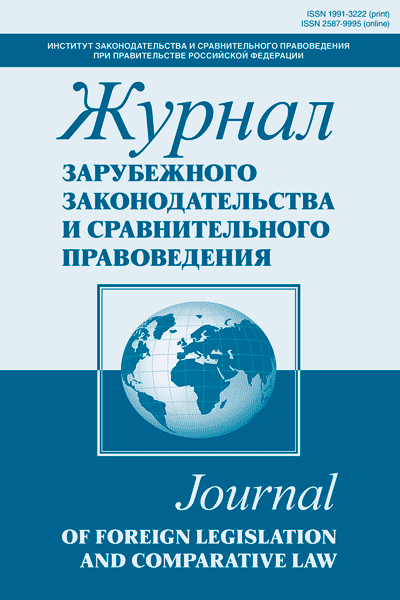This article reviews the development process for the legislation, regulating the U. S. intelligence agencies’ activities in the field of electronic surveillance. The article displays the reasons which prompted U. S. lawmakers to pass the Foreign Intelligence Surveillance Act of 1978; it analyzes the provisions of the law, governing the conditions and procedures for obtaining judicial order or Attorney General authorization on the implementation of electronic surveillance. Considerable attention is paid to the evolution of legal standards, added to the Foreign Intelligence Surveillance Act after the events of September 11, 2001. In particular, it analyzes amendments and additions to the Foreign Intelligence Surveillance Act, introduced on the basis of the USA Patriot Act of 2001, Intelligence Reform and Terrorism Prevention Act of 2004, Protect America Act of 2007, and other laws. The article also shows the patterns of formation of the legislative balance between the interests of the intelligence services and the need to respect the constitutional rights and liberties of American citizens.
Electronic surveillance, judicial order, international communication, counterintelligence activities, national security, national defense, internal security, intelligence agency, agent of a foreign power, international terrorism.
1. Omnibus Crime Control and Safe Streets Act of 1968, Pub. L. 90-351, June 9, 82 Stat. 197.
2. United States v. United States District Court 407 U. S. 297 (1972).
3. Foreign Intelligence Surveillance Act of 1978, Pub. L. 95-511, Oct. 25, 1978, 92 Stat. 1787.
4. Pub. L. 95-511, 92 Stat. 1788, 50 US Code, Sec. 1803.
5. Report and Hearings of the Subcommittee on the Judiciary U. S. Senate, 66th Congress, 1st Session, 1919, Vol. II.
6. FBI Domestic Security Guidelines: Hearings Before the Subcommittee on Security and Terrorism, 97th Congress, 2nd Session, Washington, Governmental Printing Office 1983.
7. Uniting and Strengthening America by Providing Appropriate Tools Required to Intercept and Obstruct Terrorism (USA Patriot Act) Act of 2001, Oct. 26, 2001, 115 Stat. 272.
8. Clapper, Director of National Intelligence et al. v. Amnesty International USA et al. URL: http://www.supremecourt.gov/opinions/12pdf/11-1025_ihdj.pdf.
9. USA PATRIOT Improvement and Reauthorization Act of 2005, Pub. L. 109-177, Mar. 9, 2006, 120 Stat. 192.
10. USA PATRIOT Act Additional Reauthorizing Amendments Act of 2006, Pub. L. 109-178, Mar. 9, 2006, 120 Stat. 278.
11. Letter from Attorney-General Alberto Gonzales to Senators Patrick Leahyand Arlen Specter. URL: http://graphics8.nytimes.com/packages/pdf/politics/20060117gonzales_Letter.pdf.
12. FISA Amendments Act Reauthorization Act of 2012 Pub. L. 112-238, Sec. 2, Dec. 30, 2012, 126 Stat. 1631.
13. Pub. L. 90-351, title III, Sec. 802, June 19, 1968, 82 Stat. 213.
14. Hostage Act of 1978, Pub. L. 95-426, Oct. 7 1978, 92 Stat. 989.
15. Pub. L. 95-511, Oct. 25, 1978, 92 Stat. 1787.
16. Pub. L. 103-359, title VIII, Sec. 807(a)(3), Oct. 14, 1994, 108 Stat. 3443; Pub. L. 105-272, title VI, Sec. 601(2), Oct. 20, 1998, 112 Stat. 2404.
17. Pub. L. 107-56, title V, Sec. 504(a), Oct. 26, 2001, 115 Stat. 364.
18. Pub. L. 107-108, title III, Sec. 314(a)(1), Dec. 28, 2001, 115 Stat. 1402.
19. Title VI. Reporting Requirement, Dec. 17, 2004, 118 Stat. 3743.
20. Pub. L. 108-458, title VI, Sec. 6001(a), Dec. 17, 2004, 118 Stat. 3742.
21. Pub. L. 109-177, title I, Sec. 102(b), Mar. 9, 2006, 120 Stat. 195.
22. Protect America Act of 2007, Pub. L. 110-55, Aug. 5, 2007, 121 Stat. 552.
23. Pub. L. 110-261, title I, Sec. 402-404, July 10, 2008, 122 Stat. 2473.
24. Pub. L. 112-14, Sec. 2(b), May 26, 2011, 125 Stat. 216.





